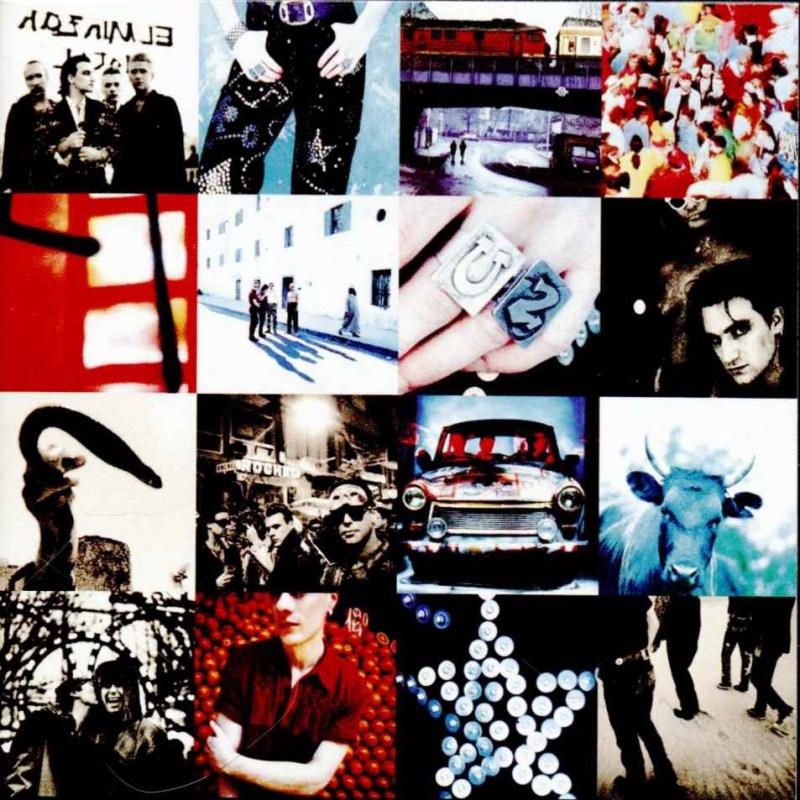
Achtung Baby (1991)

1. Zoo Station 2. Even Better Than The Real Thing 3. One 4. Until the End of the World 5. Who's Gonna Ride Your Wild Horses 6. So Cruel 7. The Fly 8. Mysterious Ways 9. Tryin' To Throw Your Arms Around the World 10.Ultraviolet (Light My Way) 11.Acrobat 12.Love is Blindness
If there was ever any lingering doubt as to U2’s place among the greatest bands of the 20th century, Achtung Baby silenced it for good. But more than just the album itself, it’s the context surrounding its creation that makes the achievement all the more astonishing. Following the somewhat bloated, uneven sprawl of Rattle and Hum, and the cathedral-like heights of The Joshua Tree, U2 found themselves, quite suddenly, unsure of what to do next. They were global icons, yes—but also creatively fatigued, personally fractured, and at odds with the very idea of what it meant to be U2.
The early sessions for the new album were, by most accounts, disastrous. Tension was high. Ideas were scarce. The band was teetering on collapse. And then, almost by accident, something happened. A shift. Influenced by European club culture, industrial textures, and the swirling sounds of Berlin, they stumbled—almost blindly—into something entirely new. By the time the dust settled, they had reinvented themselves.
This was the beginning of U2’s so-called “techno” phase, although to reduce Achtung Baby to a genre label is to miss the point entirely. Yes, it is electronic in places. Yes, it is loud, gritty, distorted, and occasionally surreal. But it is also smart, tuneful, precise, and—most of all—liberating. In many ways, this is the freest the band has ever sounded.
The opening track, Zoo Station, wastes no time setting the tone: a chaotic clatter of effects, fuzzed-out guitar, and thudding drums. For a brief moment, you might wonder if your stereo is malfunctioning. But that was exactly the point. This was not your older brother’s U2. And if Zoo Station was a mission statement, then The Fly—with its squalling guitars and leather-clad swagger—was the manifesto.
And yet, beneath the sonic experimentation lies a deeply human core. One, arguably the emotional centerpiece of the record, remains one of the band’s finest moments—lyrically introspective, musically restrained, and devastating in its simplicity. Love is Blindness closes the album with a mournful elegance, Edge’s guitar unraveling like thread in the dark.
Even in its quieter moments, the album never loses its intensity. Tracks like Until the End of the World and Ultraviolet (Light My Way) strike a balance between menace and beauty. Meanwhile, songs like Mysterious Ways and Even Better Than the Real Thing inject a danceable groove, proving that U2 could move bodies as well as minds.
The transformation wasn’t confined to the studio. When the band took Achtung Baby on tour, they did so with a bombastic, postmodern flair that rewrote the rules of live performance. Gone were the cowboy hats and earnest declarations. In their place: video walls, satellite feeds, ironic stage personas, and Bono’s now-iconic Fly shades. It was theatrical, excessive, and unapologetically self-aware—and it worked brilliantly. Ten of the album’s twelve tracks were performed nightly. The band’s early material was almost entirely left behind.
Some fans resisted the change. But most recognized it for what it was: evolution. Achtung Baby was not only a reinvention—it was a reaffirmation. It proved that U2 could take risks, break form, and still produce something extraordinary. This was not just survival. This was a rebirth. And for a band already standing atop the musical summit, that might be the most impressive feat of all.